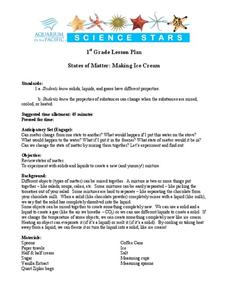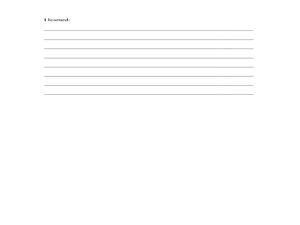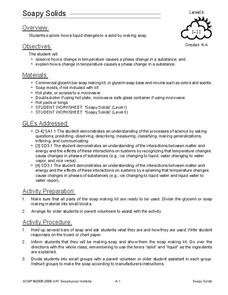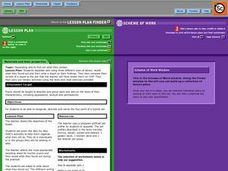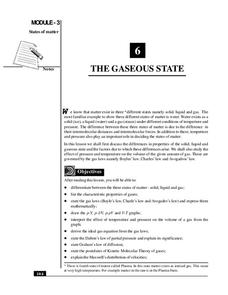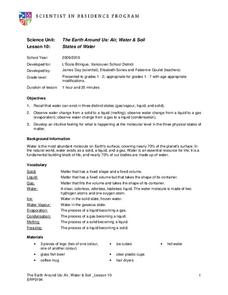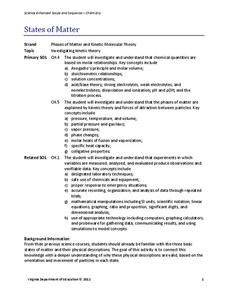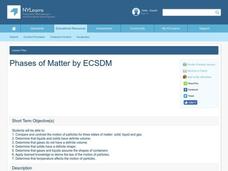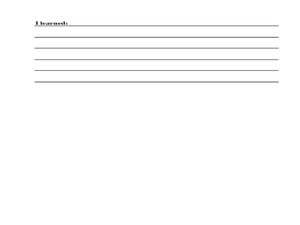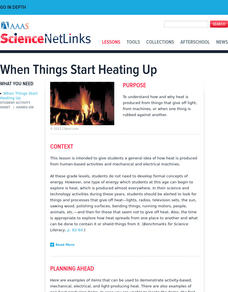Curated OER
Phases of Matter
Eighth graders practice using correct vocabulary and apply content knowledge related to phases of matter when answering questions about situations or observations from everyday life.
Curated OER
Making Ice Cream
First graders create ice cream in class. In this matter lesson, 1st graders discover solids, liquids and gases and the properties of each. Students produce a batch of ice cream in class using household items.
Curated OER
Heat and Matter
Students explore liquids and solids by conducting in class experiments. In this matter lesson, students define the properties of matter and how heat can change those properties. Students experiment with heating objects such as butter and...
Curated OER
Soapy Solids
Young scholars observe and explain how a change in temperature causes a physical change in a substance. In this physical science lesson plan, students use a soap making kit to observe the effects of adding heat to the bar soap as they...
Curated OER
Funny Putty
Learners are introduced to the properties of solids, liquids and gases. They see that colloids are mixtures which display the properties of more than one of these states. They engage in an excellent experiment which demonstrates this fact.
Curated OER
Materials And Their Properties
Seventh graders investigate the particulate level of solids, liquids, and gases. They examine how the particle method show the interplay between scientific theories and evidence.
Curated OER
Who Wants to be a Millionaire? Changing State
A teacher with talent has created a fun set of review questions on the changing states of matter. Cycle through 15 questions, multiple choice answers, and a monetary reward for guessing correctly. Use this game show PowerPoint to help...
National Institute of Open Schooling
The Gaseous State
Sixth in a series of 36, this lesson focuses on gases and their behavior in given situations. Learners review the states of matter and then focus on gases, specifically learning Boyle's, Charles's, Avogadro's Laws, Dalton's, and Graham's...
Curated OER
Science: The States of Matter
Third graders conduct experiments in matter to create chemical changes resulting in gases. By mixing solids and liquids, they create a chemical reaction and capture the gas in balloons. After observing the balloons fill with carbon...
Curated OER
Cool Stuff
Young scientists must place a check mark next to the answer they think is correct regarding things that are warm, cool, hard, and soft. This would be a good way to begin discussing how some things actually change states of matter...
Curated OER
Dry Ice: Simply Sublime
A fascinating lesson on states of matter is here for your young scientists. Dry ice is used to challenge learners preconceived notions about how solids work. They discover all sorts of interesting facts about states of matter from...
Curated OER
Is it Permeable?
The question is posed, is it permeable or impermeable, it's up to your critical thinkers to determine the answer. This presentation provides several scientific concepts related to permeability and the properties of matter alongside...
Exploratorium
Bubble Suspension
Create a cushion of carbon dioxide gas to float some soap bubbles on. Many concepts can be demonstrated through this activity:
Carbon dioxide gas is more dense than air
Bubbles are semipermeable, allowing only carbon dioxide to diffuse...
Curated OER
States of Matter
By viewing this PowerPoint your students' understanding of molecular energy should increase. The properties and inter-particular forces are summarized. The logical progression of information is useful, but more data to demonstrate...
Curated OER
States of Water
Students investigate the 3 states of matter. In this physical science "matter" lesson, students observe and participate in a number of demonstrations involving melting and freezing water. Students observe the effect heat has on changing...
Curated OER
Waterproof Paper
Students explore matter through the concept of displacement. They perforrm an inquiry experiment with a glass, paper and a bucket to demonstrate that gases take up space.
Curated OER
"States of Matter"
Students investigate the different states of matter by experimenting in class. In this matter lesson, students participate in a lab activity moving from one station to the next creating different formations of matter. Students view the...
Curated OER
Phases of Matter
Students describe the motion of solids, liquids and gases. In this chemistry lesson, students describe how temperature affect motion of the particles. They determine the physical properties of each phase.
Curated OER
Changing States of Matter - Making Ice Cream
Students make ice cream as a result of viewing changes of states of matter. In this matter lesson plan, students learn how heating and cooling can effect a state of matter to change.
Curated OER
What's The Matter?
Fourth graders accurately describe various states of matter, Through experimentation, they change a variable to create a new state of matter. Students record their observations about the way matter is changed and the changes that occur...
Curated OER
Ice cream in a Bag
Students make ice cream from scratch. They discuss the Food Guide Pyramid and what constitutes healthy and unhealthy food choices. Students experiment states of matter - solids, liquids, and gases. They predict each stage of the ice...
Urbana School District
Fluids
In 1879, Sir William Crookes discovered the fourth state of matter, plasma. The presentation covers states of matter, phase changes, density, pressure Pascal's Principle, buoyant force, Archimedes' Principle, Bernoulli's Principle,...
Santa Monica College
The Density of Liquids and Solids
There are underwater rivers that flow on the ocean floor thanks to a difference in density. Scholars learn about the density in both liquids and solids in the second lesson of an 11-part series. They then determine the density of water,...
Curated OER
Water 1: Water and Ice
Students experiment with states of matter with water and ice. In this states of matter lesson plan, students experiment to discover what happens to water as it freezes to become a solid, ice. They observe what happens when ice melts back...



